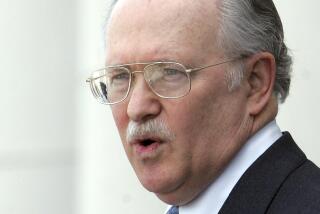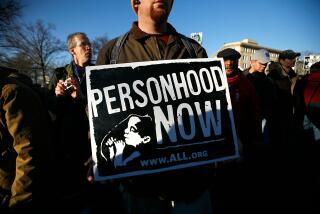Methodists’ Miscarriage Rite Stirs Debate
- Share via
The United Methodist Church is considering a new ceremony intended to comfort families grieving over a miscarriage, but the rite’s language seems almost certain to spark debate on another front--abortion.
As proposed by a committee charged with preparing a new Book of Worship for the 9-million-member denomination, the “service of hope” for miscarried pregnancies refers to the fetus as “this infant, the child of . . .”
It is that language, committee members acknowledge, that could be enlisted by opponents of abortion who contend that terminating a pregnancy is taking a human life.
Under the church’s Book of Discipline, the legal option of abortion is supported under some circumstances--for example, in cases where the life and well-being of the mother are at stake--a position viewed as far too permissive by many United Methodist opponents of abortion.
Despite concerns that the language could become a tool in the debate on abortion, the committee decided to go forward with it because the need for a ritual in cases of miscarriage is so great, according to the Rev. Andy Langford, general editor of the Book of Worship.
Such a service, he said in an interview, was among the most requested items as the committee solicited suggestions from pastors across the denomination.
“The call is too strong to say, ‘It’s too hot, we’re not going to deal with it,’ ” said Langford.
The new Book of Worship would replace the current manual, which was published in 1965. The recommendations of the committee are to be acted on at the church’s 1992 General Conference, the denomination’s highest policy-making body.
According to a church report of the committee’s February meeting in Nashville, Tenn., the Rev. Ann B. Sherer of Nacogdoches, Tex., told other committee members: “Pastors counsel with couples who desperately want a child and suffer a tragic loss through miscarriage. They need a way to help the parents and loved ones acknowledge their grief and offer each other hope.”
Some committee members, such as W. R. Auvenshine, raised the point that some United Methodists might use the recommended liturgy to challenge the church’s abortion stance.
But Auvenshine said that should not prevent adoption of the service of hope, saying, “Helping pastors give care to those who are hurting is the most important thing.”
The Rev. Paul Stallsworth, president of the Task Force of United Methodists on Abortion and Sexuality, an anti-abortion group, hailed the liturgical rite as an indication that the church recognizes the “welcoming” of a child “doesn’t just begin at birth . . . the welcoming begins before birth.”
He said in an interview that such a liturgy could help “bend the abortion discussion away from politics and into the pastoral realm” of “truth telling” and talk of “sin and grace and discipleship.”
The rite could possibly have an impact, he predicted, at the church’s 1992 conference “in favor of the human rights (anti-abortion) side.”
Ellen Appelbaum, communications director for the Religious Coalition for Abortion Rights in Washington, said the organization would object to the use of “infant” or “child” in the context of abortion. But in connection with mourning a miscarriage, she said, the organization would be “in favor of any language that would assist in that process.”
According to Langford, the service of hope offers alternative language for mourners who do not wish to use the infant and child terminology. It could be used privately, with pastor and parents only, or in corporate worship.
Asked if the service of hope could be used in cases of abortion, Langford said, “My response is that it could be used for something like that but probably wouldn’t be.”
Langford did not rule out the possibility that the committee might explore development of a “rite of reconciliation” intended for use in cases of abortion.
According to Langford, the Catholic Church and at least one other Protestant denomination, the Evangelical Lutheran Church in America, have liturgies that refer to “child” in cases of miscarriage.
The Lutheran service, like the proposed United Methodist liturgy, contains alternatives for people who do not choose to identify the fetus as a child.
More to Read
Sign up for Essential California
The most important California stories and recommendations in your inbox every morning.
You may occasionally receive promotional content from the Los Angeles Times.













